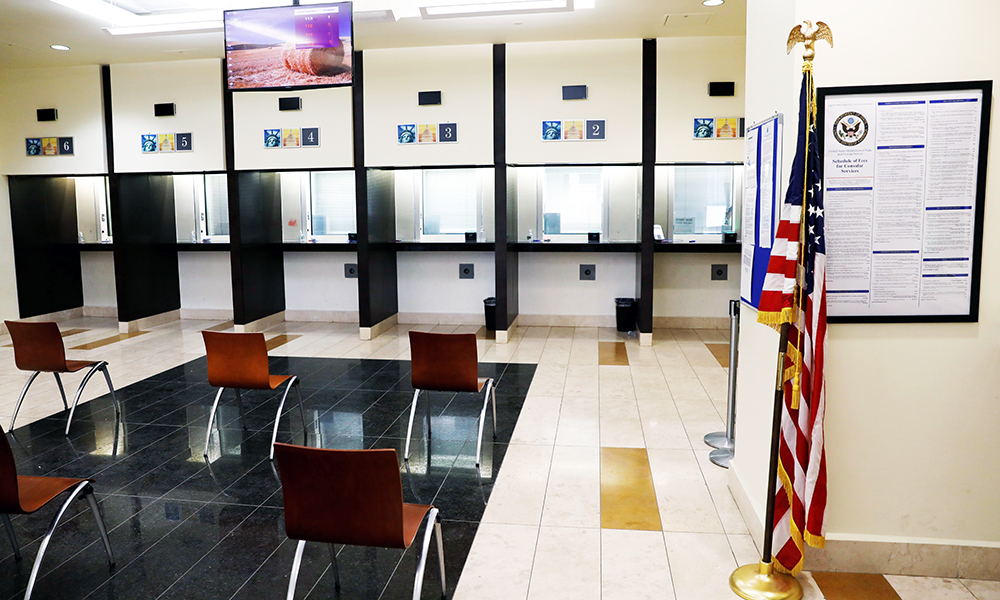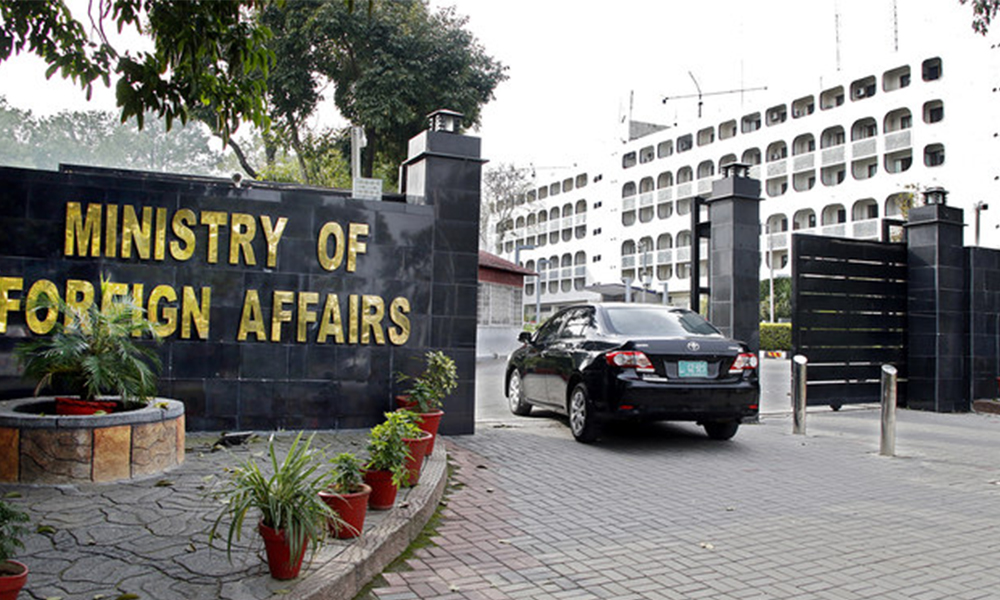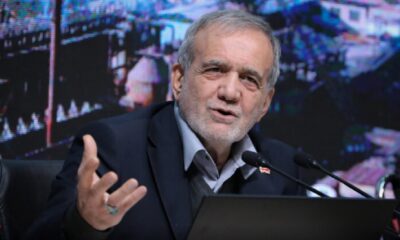Latest News
U.S. mobilizes 3,000 troops to Kabul for embassy staff drawdown

Faced with unexpectedly rapid military gains by the Taliban, the United States decided on Thursday to dramatically scale down its embassy in Kabul and send about 3,000 troops temporarily to aid the evacuation of staff, Reuters reported.
News of the drawdown, which was first reported by Reuters, underscored Washington’s rapidly deteriorating hopes that diplomacy will halt the Taliban’s advance and keep the capital in the Afghan government’s hands. The Taliban could isolate Kabul within 30 days and take it over in 90, U.S. intelligence assessments concluded this week.
“We’ve been evaluating the security situation every day to determine how best to keep those serving at the embassy safe,” said State Department spokesman Ned Price.
“We expect to draw down to a core diplomatic presence in Afghanistan in the coming weeks,” he said, adding the embassy was not closed. A person familiar with the matter said there were no guarantees the embassy would remain open.
According to the Reuters the State Department said Secretary of State Antony Blinken and Defense Secretary Lloyd Austin spoke to Afghan President Ashraf Ghani on Thursday and told him the United States “remains invested in the security and stability of Afghanistan” in the face of Taliban violence.
They said Washington was reducing its “civilian footprint” in Kabul given the “evolving security situation” and would increase the tempo of Special Immigration Visa flights for Afghans who helped the U.S. effort in the country, a State Department statement said.
The officials also said Washington remained committed to maintaining a strong diplomatic and security relationship with the Afghan government and “Secretary Blinken affirmed that the United States remained committed to support a political solution to the conflict,” it added.
President Joe Biden ordered the embassy drawdown during a meeting on Thursday with top security advisers and accepted their recommendation to do so, according to a source familiar with the situation, Reuters reported.
A decision to stay in the country might have required the commitment of many more U.S. troops there to fight a civil war, the source said, as the United States looks to end its 20-year presence prompted by the Sept. 11, 2001, attacks.
Still, the decision cast new doubt on Washington’s strategy to influence Afghanistan’s peace process by maintaining aid and diplomatic personnel even after the troop withdrawal.
Administration officials did not adjust that timetable even as Biden ordered additional troops to Afghanistan to help secure the exit of civilian personnel. The first deployment to the airport in Kabul is expected within 24 to 48 hours, Pentagon spokesman John Kirby said.
About 3,500 additional U.S. troops would be sent to the region from Fort Bragg in North Carolina to be on standby if the situation worsened, as well as 1,000 personnel to help process Afghans going through a special immigration process. It is common for the U.S. military to send in troops to evacuate personnel in combat zones.
“I don’t know that we have many choices left,” said Ronald Neumann, U.S. ambassador to Afghanistan from 2005 to 2007, about the decision to downsize the embassy. “What’s left between Kabul and the Taliban?”
STAFF REDUCTION TO BE ‘SIGNIFICANT’
Some Republican lawmakers who opposed Biden’s decision to withdraw troops said they thought it was a good idea to add them now to support the embassy drawdown.
“The Biden administration must move as swiftly as possible to get both American civilians and Afghans who have aided us out of the country as quickly as possible,” said Senator Jim Inhofe, the top Republican on the Armed Services Committee.
There are thought to be about 1,400 staff remaining at the U.S. Embassy in Kabul. Officials said the reduction in staff would be “significant.”
The military mission in Afghanistan is set to end on Aug. 31, with roughly 650 troops remaining in the country to protect the airport and embassy.
Washington is not counting on a power-sharing agreement being reached between the Kabul government and the Taliban but is seeking one to halt the fighting, according to one source. The United States has told the Taliban directly that they will face consequences if Americans are not safe, the source said.
“While the security situation in Afghanistan is deteriorating, our strategy in the region must continue to evolve,” said Representative Adam Smith, a Democrat who is chairman of the House Armed Services Committee. “The safety and security of United States personnel must always come first.”
Latest News
Pakistan summons Afghan diplomat over deadly attack in North Waziristan

Pakistan on Friday summoned Afghan Deputy Head of Mission in Islamabad to convey “strong demarche” over a deadly attack on a military camp in North Waziristan District that killed four Pakistani soldiers.
In a statement, Pakistan’s Ministry of Foreign Affairs said the attack was carried out by a faction of Tehreek-i-Taliban Pakistan (TTP).
The statement said that Pakistan conveyed “grave concern over the continued support and facilitation” provided by the Islamic Emirate to TTP.
Pakistan has demanded “a full investigation and decisive action against the perpetrators and facilitators of the terrorist attacks launched against Pakistan from Afghan soil.”
It urged the Islamic Emirate “to take immediate, concrete and verifiable measures against all terror groups operating from its territory, including their leadership, and deny the continued use of Afghan soil for terrorism against Pakistan.
According to the statement, the Islamic Emirate has been “categorically informed that Pakistan reserves the right to defend its sovereignty and protect its citizens, and will take all necessary measures to respond to terrorism originating from Afghan soil.”
Pakistani officials have repeatedly claimed that attacks in the country are originated from Afghan soil, a charge the Islamic Emirate denies.
Latest News
Uzbek president stresses Afghanistan’s role in regional economic projects

President of Uzbekistan Shavkat Mirziyoyev has underscored Afghanistan’s continued importance in regional cooperation, saying the country remains one of the key areas of interaction among regional partners.
Addressing the first summit of the “Central Asia Plus Japan” dialogue, Mirziyoyev said participating countries share a common aspiration to see Afghanistan become peaceful, stable, and oriented toward meaningful development.
The Uzbek president praised Japan’s longstanding and consistent support for Afghanistan, noting that Tokyo has for many years been among the leading donors and partners assisting the Afghan people.
He expressed confidence that coordinated efforts and joint contributions by regional countries and Japan would help improve living standards in Afghanistan, advance socio-economic and infrastructure development, and facilitate the country’s active involvement in regional economic projects.
Latest News
Japan allocates nearly $20 million in humanitarian aid for Afghanistan

The Embassy of Japan in Afghanistan announced on Friday that the country has allocated $19.5 million in humanitarian assistance to Afghanistan.
In a statement, the Japanese Embassy said it hopes the aid will help bring positive change to the lives of vulnerable Afghans.
According to the statement, the assistance will cover the basic humanitarian needs of vulnerable communities in Afghanistan.
The embassy added that the aid will be delivered through United Nations agencies, international organizations, and Japanese non-governmental organizations operating in Afghanistan.
Japan’s total assistance to Afghanistan since August 2021 has reached more than $549 million.
-

 Latest News5 days ago
Latest News5 days agoGermany speeds up admission of Afghans from Pakistan
-

 Sport5 days ago
Sport5 days agoIPL 2026 Auction set for Abu Dhabi with $28.6 million purse at stake
-

 Latest News5 days ago
Latest News5 days agoAfghanistan to establish independent oil and gas authority
-

 Latest News4 days ago
Latest News4 days agoIEA supreme leader stresses enforcement of Sharia law and sincere public service
-

 International Sports5 days ago
International Sports5 days agoILT20: Desert Vipers qualify for playoffs with five-wicket win over Dubai Capitals
-

 International Sports5 days ago
International Sports5 days agoATN secures broadcast rights for four major AFC sporting events
-

 Sport4 days ago
Sport4 days agoILT20: Sharjah Warriorz secure 11-run victory over Gulf Giants
-

 International Sports3 days ago
International Sports3 days agoIPL 2026: Teams take shape after auction as franchises balance star power and depth
























